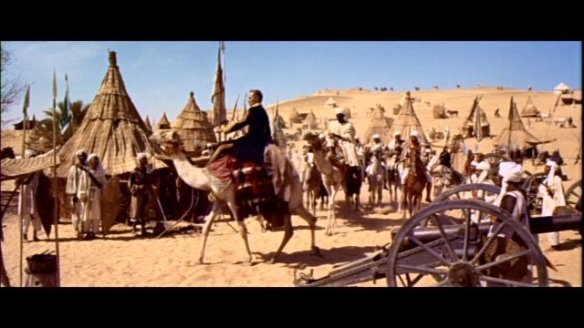General Charles Gordon (Charlton Heston) astride his camel in Khartoum, Sudan
Poster art by Frank McCarthy – who also did the poster for The Great Escape (1963)
The tragic mission of General Charles ‘‘Chinese’’ Gordon to Khartoum in 1884 was one of the most dramatic news stories of the last quarter of the nineteenth century. Gordon had already become renowned in his native Great Britain for his successful efforts to bring an end to the practice of slavery in North Africa. He had also attracted attention for helping the Manchu Empire suppress the Taiping Rebellion in China in the 1860s. But the Khartoum affair not only marked the tragic culmination of his storied career but also symbolized in broader terms the epic struggle in Britain between advocates and opponents of imperial expansion. The battle for Khartoum thus became an object lesson in modern British history.
Proponents of British imperial expansion argued that the country must project its power in the Nile River valley to protect the Suez Canal as its main trade route to the East. Critics argued that imperial overreach would inevitably entangle the country in unwinnable wars in far-off places. The film Khartoum, produced in London in 1966, dramatically captures the ferocity of the battle for the Nile as well as its significance for the future of the British Empire. General Gordon, stoically played by the American actor Charlton Heston, is a devout Christian who has devoted his life to carrying out the moral imperative of imperialism in the continent of Africa. When peace in the Sudan (then a British protectorate in the upper Nile River valley) is threatened by the forces of radical Islam led by the Muslim mystic Muhammad Ahmad—known as the Mahdi—Gordon leads a mission to Khartoum under orders to prevent catastrophe there. But Prime Minister William Ewart Gladstone, admirably portrayed by the consummate British actor Ralph Ric unwinnable war; he thus orders Gordon to lead an evacuation of the city. The most fascinating character in the film is the Mahdi himself (played brilliantly by Sir Laurence Olivier), who firmly believes that he has a sacred mandate to carry the Prophet’s words to the global Muslim community.
The conclusion of the film, set in the breathtaking beauty of the Nile River valley, takes place as the clash of wills reaches a climax in the battle for control of Khartoum. Although the film’s portrayal of a face-to-face meeting between Gordon and the Mahdi is not based on fact, the narrative serves as an object lesson on the dangers of imperial overreach and as an eerie foretaste of the clash between Islam and Christendom in our own day.
